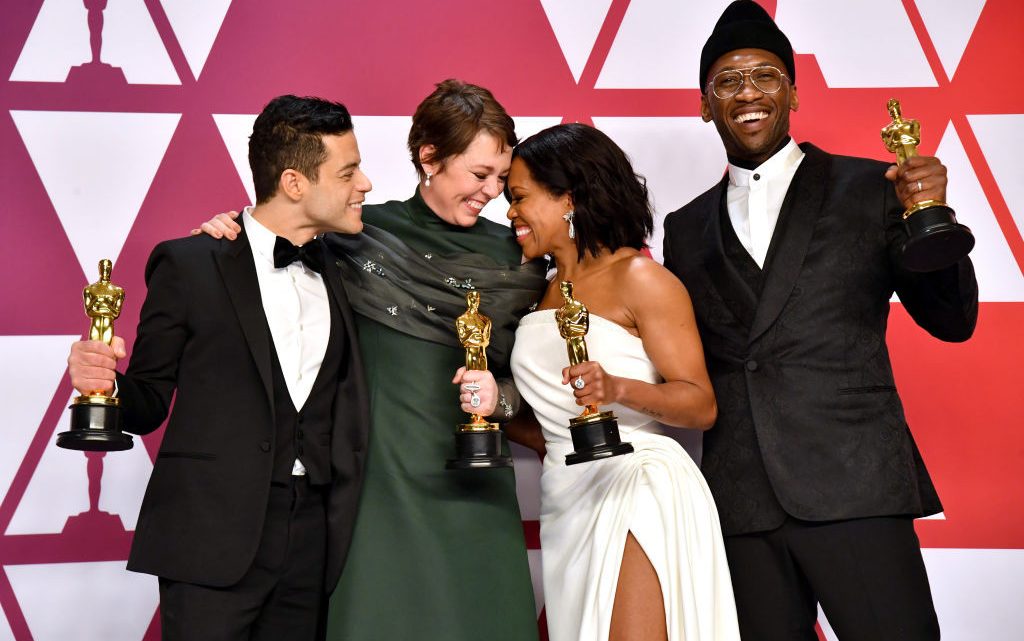
The Oscars Should Never Go Back to Having a Host
February 25, 2019For years, the Oscars has been trying to rescue itself from plummeting ratings, and their more recent strategies for revitalizing the long-winded award show have been, uh, confusing, to say the least. The 2019 Oscars vacillated between adding and redacting categories—from the show itself and the live telecast—in the weeks leading up to it. A “Best Popular Film” category was added, and cinematography, film editing, live-action short, and makeup and hairstyling awards were nearly relegated to the commercial breaks. After public confusion and outrage, the Academy of Motion Picture Arts and Sciences, and ABC (which broadcasts the show) decided to go back on both of those decisions, something Tina Fey, Amy Poehler, and Maya Rudolph poked fun at while presenting the Best Supporting Actress prize.
Given this capitulation, it didn’t feel that strange to go host-less for the Oscars, especially after Kevin Hart stepped back from the role when his past homophobic remarks were unearthed. (And early ratings indicate some of these Oscar formatting shake-ups may have worked). But the decision still felt like it could have been a gamble, considering the last time the show went without a host.
The 61st Academy Awards, held back in 1989, went without an emcee, opening with a musical number that tarnished the evening and the reputations of those who performed in it. The number showcased a weird mashup of showtunes and a Snow White impression—you can check it out on YouTube, in the aptly titled video "The 11 minutes that ruined Hollywood producer Allan Carr's career forever."
To be fair, it isn't easy being an Oscars host. They’re tasked with delivering speeches and bits of comedy that make political statements that aren't too political—ones that won't rock the boat too hard. It's become a lot tougher to pull that off in the #MeToo era, especially when the Trump administration is pushing policies that directly and negatively affect many people standing in that very room.
Hosts also have to please a pantheon of artists and audience members, whose tastes and talents diverge significantly. Add in the magnitude of personality in the room—these are A-list actors, after all—and it’s hard not to recognize the enterprise as, basically, deeply idiotic, a potential death trap for celebrities with even the best of reputations. Case in point: Anne Hathaway.
The solution is, evidently, to simply let the talent stand on its own. Last night gave us numerous lasting images to remember: Lady Gaga and Bradley Cooper intimately crooned "Shallow;" Awkwafina and John Mulaney leaned on their self-effacing senses of humor, giving us a glimpse into what they’d look like in a buddy comedy; Spike Lee koala-hugged Samuel L. Jackson when accepting his Best Adapted Screenplay award for BlacKkKlansman—a moment so pure because of its completely unrestrained joy between two close friends. And the 1989-esque fiasco was avoided thanks to a safe, milquetoast opening: an homage to Queen that adequately referenced the success and award-potential of Bohemian Rhapsody, followed by a fun—but similarly safe—opening by comedy vets Fey, Rudolph, and Poehler.
By losing a major opening number—and ditching a stilted monologue from a host trying to show off every ounce of razzle and dazzle they've got—the show also gave presenters and recipients space to politicize the Oscars themselves. It’s a strong solution to the Oscar’s typically janky optics, borne from asking a single person to usher an annual award show with the exact right amount of political indignation, humor, and grace. In place of waiting for a surprisingly underpaid comedian to make a public gaffe while they deliver a series of bland, mildly politicized jokes in the form of an overlong opening monologue, we were able to engage more readily with the politics of individual award winners from marginalized communities. We were better able to focus on their triumphs, their heartfelt speeches. And seeing so many people of color at the podium Sunday night meant those messages touched on subjects legitimately important to the national discourse, ones that, historically, haven't had a place at the Oscars.
These standout moments included an anti-Trump callout from Javier Bardem: "There are no borders or walls that can restrain ingenuity and talent." Hannah Beachler became the first African American to be nominated in and to win an Oscar for Best Production Design, an outstanding win for a woman who created the visual language for Black Panther’s gorgeous, afro-futurist narrative that sparked a global phenomenon. Ruth E. Carter won Best Costume Design for Black Panther—her stunning costuming is an incredibly critical part of the film, thanks to her deeply researched, inventive, futuristic updates to traditional African garb—becoming the first African American to win in this category, as well. These are Oscar wins for the books, in categories that are historically reserved for white-cast period pieces.
Rayka Zehtabchi became the first Iranian-American woman to win an Oscar, for a film about menstruation, no less. "A period should end a sentence, not a girl’s education," she said in her acceptance speech. There’s also Domee Shi, the first woman to direct a Pixar short, winning Best Animated Short for Bao, a film rooted in the Asian American experience. She dedicated her acceptance speech "to all the nerdy girls who hide behind their sketchbooks," encouraging them to not be "afraid of sharing your stories with the world." Yalitza Aparicio was the first indigenous woman to have been nominated for an Oscar, and while she didn't take home the win, her presence there was vital—a crucial step in the right direction in the Academy's pledge to become more diverse. And let's not forget Spike Lee turning his incredibly overdue Oscar win into not just a stirring dedication to those that got him to the Oscar's stage, but a lesson in black history.
It was especially important that these underdogs were given such breathing room, considering the winner for Best Picture and Best Original Screenplay was ultimately a massive insult—Green Book's white savior narrative is offensive and tired—and there wasn't a single woman nominated for Best Director. In removing a host from the Oscars, fresh winners were given the headroom to speak about their own accomplishments. It also made the whole thing shorter—arguably the best possible outcome for an awards show that has begun to feel antiquated, and increasingly in need of a radical facelift.
Sign up for our newsletter to get the best of VICE delivered to your inbox daily.
Follow Nicole Clark on Twitter.


